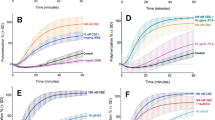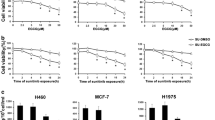Abstract
Sunitinib, a novel oral multi-targeted tyrosine kinase inhibitor for patients with metastatic renal cell carcinoma (mRCC) and advanced gastrointestinal stromal tumor, has a good prospect for clinical application and is being investigated for the potential therapy of other tumors. We observed the phenomenon that drinking tea interfered with symptom control in an mRCC patient treated with sunitinib and speculated that green tea or its components might interact with sunitinib. This study was performed to investigate whether epigallocatechin-3-gallate (EGCG), the major constituent of green tea, interacted with sunitinib. The interaction between EGCG and sunitinib was examined in vitro and in vivo. 1H nuclear magnetic resonance (1H-NMR) spectroscopy and mass spectrometry (MS) were used to analyze the interaction between these two molecules and whether a new compound was formed. Solutions of sunitinib and EGCG were intragastrically administered to rats to investigate whether the plasma concentrations of sunitinib were affected by EGCG. In this study, we noticed that a precipitate was formed when the solutions of sunitinib and EGCG were mixed under both neutral and acidic conditions. 1H-NMR spectra indicated an interaction between EGCG and sunitinib, but no new compound was observed by MS. Sticky semisolid contents were found in the stomachs of sunitinib and EGCG co-administrated mice. The \( {\text{AUC}}_{{0 - \infty }} \) and C max of plasma sunitinib were markedly reduced by co-administration of EGCG to rats. Our study firstly showed that EGCG interacted with sunitinib and reduced the bioavailability of sunitinib. This finding has significant practical implications for tea-drinking habit during sunitinib administration.




Similar content being viewed by others
References
Demetri GD, van Oosterom AT, Garrett CR, Blackstein ME, Shah MH, Verweij J, McArthur G, Judson IR, Heinrich MC, Morgan JA, Desai J, Fletcher CD, George S, Bello CL, Huang X, Baum CM, Casali PG (2006) Efficacy and safety of sunitinib in patients with advanced gastrointestinal stromal tumour after failure of imatinib: a randomised controlled trial. Lancet 368:1329–1338. doi:10.1016/S0140-6736(06)69446-4
Goodman VL, Rock EP, Dagher R, Ramchandani RP, Abraham S, Gobburu JV, Booth BP, Verbois SL, Morse DE, Liang CY, Chidambaram N, Jiang JX, Tang S, Mahjoob K, Justice R, Pazdur R (2007) Approval summary: sunitinib for the treatment of imatinib refractory or intolerant gastrointestinal stromal tumors and advanced renal cell carcinoma. Clin Cancer Res 13:1367–1373. doi:10.1158/1078-0432.CCR-06-2328
Motzer RJ, Rini BI, Bukowski RM, Curti BD, George DJ, Hudes GR, Redman BG, Margolin KA, Merchan JR, Wilding G, Ginsberg MS, Bacik J, Kim ST, Baum CM, Michaelson MD (2006) Sunitinib in patients with metastatic renal cell carcinoma. JAMA 295:2516–2524. doi:10.1001/jama.295.21.2516
Shah JJ, Kuhn DJ, Orlowski RZ (2009) Bortezomib and EGCG: no green tea for you? Blood 113:5695–5696. doi:10.1182/blood-2009-03-204776
Golden EB, Lam PY, Kardosh A, Gaffney KJ, Cadenas E, Louie SG, Petasis NA, Chen TC, Schonthal AH (2009) Green tea polyphenols block the anticancer effects of bortezomib and other boronic acid-based proteasome inhibitors. Blood 113:5927–5937. doi:10.1182/blood-2008-07-171389
Kuriyama S, Shimazu T, Ohmori K, Kikuchi N, Nakaya N, Nishino Y, Tsubono Y, Tsuji I (2006) Green tea consumption and mortality due to cardiovascular disease, cancer, and all causes in Japan: the Ohsaki study. JAMA 296:1255–1265. doi:10.1001/jama.296.10.1255
Khan N, Afaq F, Saleem M, Ahmad N, Mukhtar H (2006) Targeting multiple signaling pathways by green tea polyphenol (−)-epigallocatechin-3-gallate. Cancer Res 66:2500–2505. doi:10.1158/0008-5472.CAN-05-3636
Silverstein RM, Webster FX, Kiemle D (2005) Spectrometric identification of organic compounds [M]. Wiley, Texas, pp 25–80
Said N, Motamed K (2005) Absence of host-secreted protein acidic and rich in cysteine (SPARC) augments peritoneal ovarian carcinomatosis. Am J Pathol 167:1739–1752
Kamoun WS, Ley CD, Farrar CT, Duyverman AM, Lahdenranta J, Lacorre DA, Batchelor TT, di Tomaso E, Duda DG, Munn LL, Fukumura D, Sorensen AG, Jain RK (2009) Edema control by cediranib, a vascular endothelial growth factor receptor-targeted kinase inhibitor, prolongs survival despite persistent brain tumor growth in mice. J Clin Oncol 27:2542–2552. doi:10.1200/JCO.2008.19.9356
Kang TH, Lee JH, Song CK, Han HD, Shin BC, Pai SI, Hung CF, Trimble C, Lim JS, Kim TW, Wu TC (2007) Epigallocatechin-3-gallate enhances CD8+ T cell-mediated antitumor immunity induced by DNA vaccination. Cancer Res 67:802–811. doi:10.1158/0008-5472.CAN-06-2638
Wang ZY, Agarwal R, Bickers DR, Mukhtar H (1991) Protection against ultraviolet B radiation-induced photocarcinogenesis in hairless mice by green tea polyphenols. Carcinogenesis 12:1527–1530
Adhami VM, Malik A, Zaman N, Sarfaraz S, Siddiqui IA, Syed DN, Afaq F, Pasha FS, Saleem M, Mukhtar H (2007) Combined inhibitory effects of green tea polyphenols and selective cyclooxygenase-2 inhibitors on the growth of human prostate cancer cells both in vitro and in vivo. Clin Cancer Res 13:1611–1619. doi:10.1158/1078-0432.CCR-06-2269
Umeda D, Yano S, Yamada K, Tachibana H (2008) Green tea polyphenol epigallocatechin-3-gallate signaling pathway through 67-kDa laminin receptor. J Biol Chem 283:3050–3058. doi:10.1074/jbc.M707892200
Adhami VM, Siddiqui IA, Ahmad N, Gupta S, Mukhtar H (2004) Oral consumption of green tea polyphenols inhibits insulin-like growth factor-I-induced signaling in an autochthonous mouse model of prostate cancer. Cancer Res 64:8715–8722. doi:10.1158/0008-5472.CAN-04-2840
Mendel DB, Laird AD, Xin X, Louie SG, Christensen JG, Li G, Schreck RE, Abrams TJ, Ngai TJ, Lee LB, Murray LJ, Carver J, Chan E, Moss KG, Haznedar JO, Sukbuntherng J, Blake RA, Sun L, Tang C, Miller T, Shirazian S, McMahon G, Cherrington JM (2003) In vivo antitumor activity of SU11248, a novel tyrosine kinase inhibitor targeting vascular endothelial growth factor and platelet-derived growth factor receptors: determination of a pharmacokinetic/pharmacodynamic relationship. Clin Cancer Res 9:327–337
O’Farrell AM, Abrams TJ, Yuen HA, Ngai TJ, Louie SG, Yee KW, Wong LM, Hong W, Lee LB, Town A, Smolich BD, Manning WC, Murray LJ, Heinrich MC, Cherrington JM (2003) SU11248 is a novel FLT3 tyrosine kinase inhibitor with potent activity in vitro and in vivo. Blood 101:3597–3605. doi:10.1182/blood-2002-07-23072002-07-2307
Rock EP, Goodman V, Jiang JX, Mahjoob K, Verbois SL, Morse D, Dagher R, Justice R, Pazdur R (2007) Food and Drug Administration drug approval summary: sunitinib malate for the treatment of gastrointestinal stromal tumor and advanced renal cell carcinoma. Oncologist 12:107–113. doi:10.1634/theoncologist.12-1-107
Mirkov S, Komoroski BJ, Ramirez J, Graber AY, Ratain MJ, Strom SC, Innocenti F (2007) Effects of green tea compounds on irinotecan metabolism. Drug Metab Dispos 35:228–233. doi:10.1124/dmd.106.012047
Chow HH, Hakim IA, Vining DR, Crowell JA, Cordova CA, Chew WM, Xu MJ, Hsu CH, Ranger-Moore J, Alberts DS (2006) Effects of repeated green tea catechin administration on human cytochrome P450 activity. Cancer Epidemiol Biomark Prev 15:2473–2476. doi:10.1158/1055-9965.EPI-06-0365
Springsteen G, Wang BH (2002) A detailed examination of boronic acid–diol complexation. Tetrahedron 58:5291–5300
Tsao AS, Liu D, Martin J, Tang XM, Lee JJ, El-Naggar AK, Wistuba I, Culotta KS, Mao L, Gillenwater A, Sagesaka YM, Hong WK, Papadimitrakopoulou V (2009) Phase II randomized, placebo-controlled trial of green tea extract in patients with high-risk oral premalignant lesions. Cancer Prev Res (Phila) 2:931–941. doi:10.1158/1940-6207.CAPR-09-0121
Zhang X, Zhang H, Tighiouart M, Lee JE, Shin HJ, Khuri FR, Yang CS, Chen ZG, Shin DM (2008) Synergistic inhibition of head and neck tumor growth by green tea (–)-epigallocatechin-3-gallate and EGFR tyrosine kinase inhibitor. Int J Cancer 123:1005–1014. doi:10.1002/ijc.23585
Sartippour MR, Pietras R, Marquez-Garban DC, Chen HW, Heber D, Henning SM, Sartippour G, Zhang L, Lu M, Weinberg O, Rao JY, Brooks MN (2006) The combination of green tea and tamoxifen is effective against breast cancer. Carcinogenesis 27:2424–2433. doi:10.1093/carcin/bgl066
Shammas MA, Neri P, Koley H, Batchu RB, Bertheau RC, Munshi V, Prabhala R, Fulciniti M, Tai YT, Treon SP, Goyal RK, Anderson KC, Munshi NC (2006) Specific killing of multiple myeloma cells by (−)-epigallocatechin-3-gallate extracted from green tea: biologic activity and therapeutic implications. Blood 108:2804–2810. doi:10.1182/blood-2006-05-022814
Sonpavde G, Periman PO, Bernold D, Weckstein D, Fleming MT, Galsky MD, Berry WR, Zhan F, Boehm KA, Asmar L, Hutson TE (2010) Sunitinib malate for metastatic castration-resistant prostate cancer following docetaxel-based chemotherapy. Ann Oncol 21:319–324. doi:10.1093/annonc/mdp323
Gallagher DJ, Milowsky MI, Gerst SR, Ishill N, Riches J, Regazzi A, Boyle MG, Trout A, Flaherty AM, Bajorin DF (2010) Phase II study of sunitinib in patients with metastatic urothelial cancer. J Clin Oncol 28:1373–1379. doi:10.1200/JCO.2009.25.3922
Novello S, Scagliotti GV, Rosell R, Socinski MA, Brahmer J, Atkins J, Pallares C, Burgess R, Tye L, Selaru P, Wang E, Chao R, Govindan R (2009) Phase II study of continuous daily sunitinib dosing in patients with previously treated advanced non-small cell lung cancer. Br J Cancer 101:1543–1548. doi:10.1038/sj.bjc.6605346
Rini BI, Garcia JA, Cooney MM, Elson P, Tyler A, Beatty K, Bokar J, Mekhail T, Bukowski RM, Budd GT, Triozzi P, Borden E, Ivy P, Chen HX, Dolwati A, Dreicer R (2009) A phase I study of sunitinib plus bevacizumab in advanced solid tumors. Clin Cancer Res 15:6277–6283. doi:10.1158/1078-0432.CCR-09-0717
Acknowledgment
This work was supported partly by the National Natural Science Foundation of China (30772538, 30801365, and 31070801).
Conflict of interest
The authors have declared no conflicts of interest.
Author information
Authors and Affiliations
Corresponding author
Additional information
Jun Ge, Ben-Xu Tan, Ye Chen, and Li Yang contributed equally to this work.
Rights and permissions
About this article
Cite this article
Ge, J., Tan, BX., Chen, Y. et al. Interaction of green tea polyphenol epigallocatechin-3-gallate with sunitinib: potential risk of diminished sunitinib bioavailability. J Mol Med 89, 595–602 (2011). https://doi.org/10.1007/s00109-011-0737-3
Received:
Revised:
Accepted:
Published:
Issue Date:
DOI: https://doi.org/10.1007/s00109-011-0737-3




